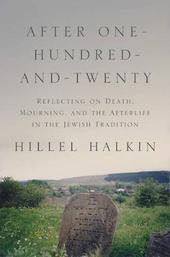
|
After One-Hundred-and-Twenty: Reflecting on Death, Mourning, and the Afterlife in the Jewish Tradition
Hardback
Main Details
| Title |
After One-Hundred-and-Twenty: Reflecting on Death, Mourning, and the Afterlife in the Jewish Tradition
|
| Authors and Contributors |
By (author) Hillel Halkin
|
| Series | Library of Jewish Ideas |
|---|
| Physical Properties |
| Format:Hardback | | Pages:232 | | Dimensions(mm): Height 216,Width 140 |
|
| Category/Genre | Judaism - theology |
|---|
| ISBN/Barcode |
9780691149745
|
| Classifications | Dewey:296.33 |
|---|
| Audience | | Undergraduate | | Postgraduate, Research & Scholarly | |
|---|
|
Publishing Details |
| Publisher |
Princeton University Press
|
| Imprint |
Princeton University Press
|
| Publication Date |
3 May 2016 |
| Publication Country |
United States
|
Description
After One-Hundred-and-Twenty provides a richly nuanced and deeply personal look at Jewish attitudes and practices regarding death, mourning, and the afterlife as they have existed and evolved from biblical times to today. Taking its title from the Hebrew and Yiddish blessing to live to a ripe old age--Moses is said to have been 120 years old when h
Author Biography
Hillel Halkin is an author, translator, critic, and journalist. His books include Jabotinsky: A Life and Yehuda Halevi, which won the National Jewish Book Award. He lives in Israel.
ReviewsLong-listed for the 2017 Jewish Quarterly Wingate Prize "It's refreshing to read a Jewish book on death that does not presume to offer guidance, either through that dark portal, or around it. Instead, Hillel Halkin ... has written a brief, pellucid account of the role death has played in Jewish texts, law, thought and lives--including his own."--Esther Schor, Wall Street Journal "[A]n accessible and trenchant exploration of Judaism's evolving concepts of death with his own struggle with understanding it... Halkin's frankness about his own difficulties in coming to terms with his parents' deaths and traditional Jewish rituals such as sitting shiva help make this nuanced quest for meaning personal and affecting."--Publisher's Weekly "By combining historical examples with his firsthand experiences, Halkin has created a well-rounded and thoroughly readable examination of how Jews face the unknown."--Jeff Fleischer, Foreword "Literary scholar, premier translator of Hebrew and Yiddish literatures, depth reporter on modern Israeli life, and on the far side of 75, Halkin is just the man to condense the riches of Jewish thanatology... What begins as analytic history ends in deeply moving, reflective memoir."--Ray Olson, Booklist "A very user-friendly historical account of Jewish ideas about death ... and how those ideas change... [Halkin] is a master at 'popularisation' in the best sense of that term, bringing to a non-academic audience what are, in essence, some very complicated ideas."--David Hillel-Ruben, Jewish Chronicle "Hillel Halkin, an American-born Israeli scholar and novelist, poignantly explores his own experiences while providing a history of Jewish thought."--Amy Frykholm, Christian Century "Hillel Halkin's After One-Hundred-and-Twenty: Reflecting on Death, Mourning and the Afterlife in Jewish Tradition is both instructive and thought-provoking... One would be hard-pressed to find a more knowledgeable or astute guide through the vast literature of Jewish thanatology than Hillel Halkin... Warm and affable, Hillel Halkin is also one of the flat-out brainiest persons I've ever met... The Biggest of Mysteries being tackled by one of our best and brightest."--Matt Nesvisky, Jerusalem Post "As he completes the eighth decade of his life, the distinguished author, critic, translator, and journalist Hillel Halkin ruminates in this learned and beautifully written book on mortality, including his own, and 'death, mourning, and the afterlife in the Jewish tradition'... Anyone interested in the history of Jewish views concerning the afterlife and changing Jewish thinking about death from biblical times to the present should begin with this volume."--Choice "At once scholarly and passionate, secular and religious, detached and autobiographical."--Edward Alexander, Chicago Jewish Star "Charming, frankly vulnerable, and deceptively deep book about death."--Abraham Socher, Jewish Review of Books
|